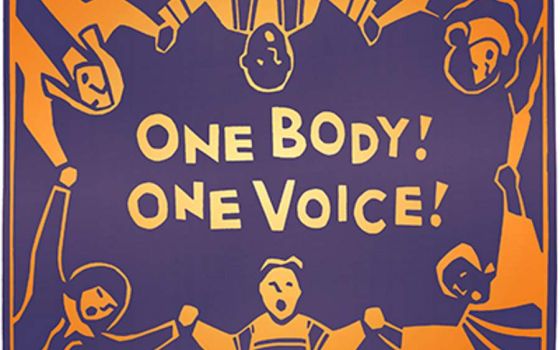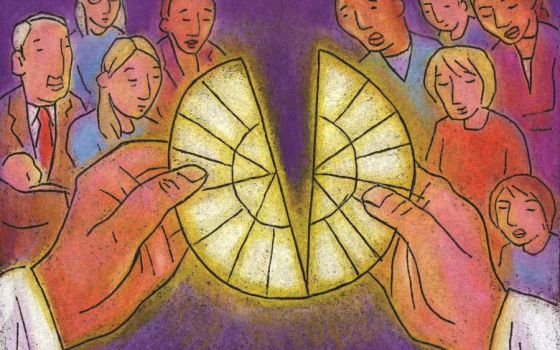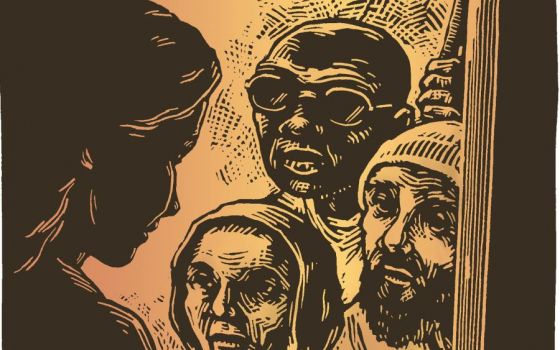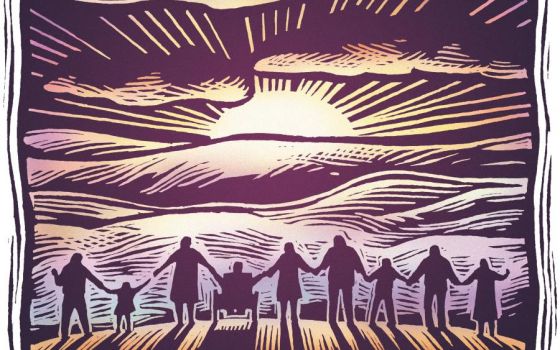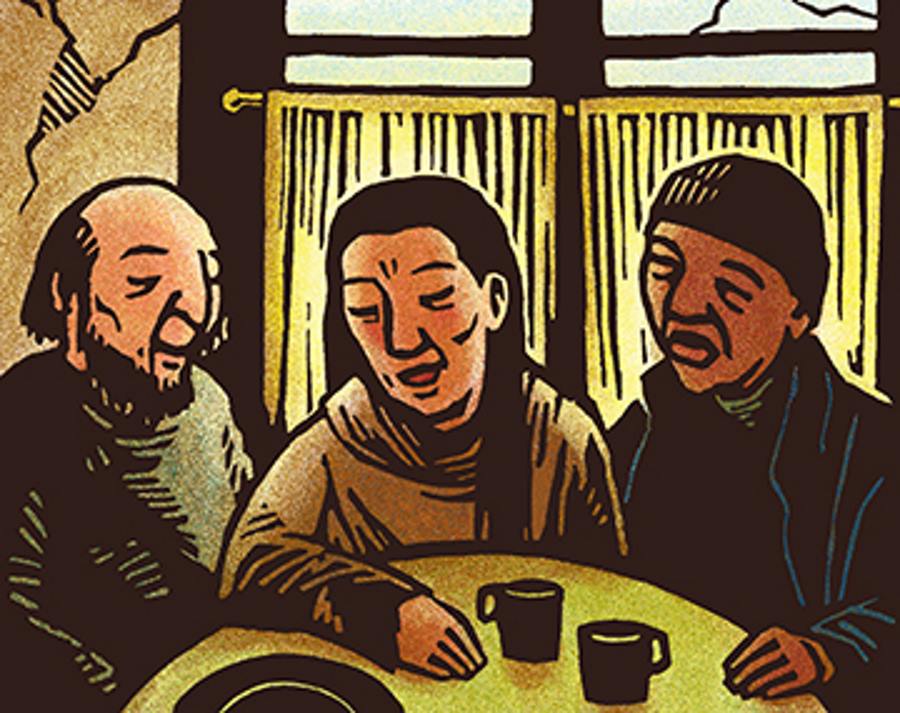
(Julie Lonneman)
A homiletics professor once told his class that Trinity Sunday is the Sunday for which most presiders get a substitute. It isn't because they're taking their summer vacation during that time; he meant that it appears many preachers just don't know what to say about the Trinity, how to interpret the scriptures or explore the doctrine with their communities.
Because the Trinity, the Incarnation and Redemption lie at the doctrinal core of our faith, they warrant exploration by preachers. Communal reflection and the liturgical celebration of these beliefs can yield important truths about who we are as church. Doctrinal preaching fosters a living, dynamic faith. Even if we struggle to get beyond words and formulas and end up with God as mystery, what we say about God is also about us, who we are, why we are and what we are about in this world as Christians.
Relational imagery
A three-leaf clover, a triangle, intertwining circles — these are all familiar catechetical attempts to convey a graspable image for a mysterious trinitarian concept. Quantitative images quickly reveal the impossibility of three being one. Qualitative and relational metaphors help. God is love, and the love between Father and Son is so profound that it begets a third Person, the Spirit. Our human experience of love approaches the mystery: I can remember catching a glimpse of the power of this relational God when I saw my first child at the moment of her birth (and the fact that she was followed by a twin sister a minute later does not discount this initial sensation of new life). As I, a new mother, and their father looked at these babies, we both cried at what our love had created.
The mind devises concepts, images, outlines, metaphors. The heart pursues these by desire and by prayer to the borders of mystery. Even when something says, "Stop asking so many questions!" we proceed, because a mystery has so many layers that we are enriched by an abundance we never exhaust. Our deepest human experiences reveal the Trinity, again and again.
Our God is a community. What an amazing reflection on the concept of three persons of the Godhead. God as a community demonstrates the power of relationships. The love between these divine persons generates tremendous power and becomes the expanding life force of everything that is. The scriptures tell the story of a love source that has such depth that it spills over with the names and images of the Divine: Creator, Breath of Life, Redeemer, Sophia, Beloved, Abba, Shepherd, Wisdom, Bread of Life, Word, Sanctifier, Light, Source; the list is powerful and endless.
God as commmunity
We are created in the divine image and likeness, so it is no surprise that we as individuals are marked by the Trinity and meant for community. Communities unite the rich diversity of persons, who are all reflections of this very triune God. Original sin struck at this original design for creation, dividing man from woman, humans from nature, introducing competition, deception, violence into the world. Redemption is the long journey back to God's image and likeness. But it is not the smoothing out of differences; it is the work of love that creates unity from diversity. Incarnation is God's intimate involvement in this work of love. Jesus models the dynamic indwelling of God for us. Love is a many-splendored thing, with each person enriching the whole. Communities are bursting with possibilities because love allows, even promotes, diversity.
Communal life within the trinitarian pattern is not easy. Someone once pointed out that threes in relationships don't work; one person is always left out. The human tendency to exclude is the focus of redemptive love. Instead of being an image of exclusion, the three Persons in one God gives us a dynamic model of relationships. It was both a new teaching and a fresh interpretation of ideas already present in the Hebrew scriptures. St. Paul's letters reveal the first indications of an attempted bridge from Jewish monotheism to the Christian belief in a communal dimension to God. Early attempts to explain how God was present in Jesus, Abba and Spirit took centuries before the Christian community gave creedal form to the mystery of the Trinity.
The creed does not explain or resolve the mystery but keeps us focused on the challenge of unity in diversity, especially in our struggle to build community. There is a saying about love that when one lover cries the other tastes salt. Our God is that interwoven and intimate with us.
Every time we speak the names of God, we encounter the mystery of God's love. All the facets and faces of God merge. A medieval fresco in Perugia, Italy, depicts the three faces of the Trinity as one face looking in different directions. It is not as if the Creator was resting while the Redeemer was walking incarnate among humanity or the Spirit takes over because the Messiah has risen. They are the same God.
We continually remind ourselves that in our attempts to even try to define the Persons of God, we limit God. Whatever art, words or titles we use, they are always incomplete and inadequate. But this does not stop us from attempting to name and express our understanding of the depths of God's love for us. What in our world, we ask, mirrors the love that unites differences? Can Trinity help us peel back the layers of mystery in our own efforts to love?
Our essential unity
We learn even from tragedy just how united we are in our common humanity, how much we are one. On March 23, 1980, in a sermon given days before he was murdered, San Salvador's Archbishop Oscar Romero said this to the soldiers of the Salvadoran army: "I want to make a special appeal to soldiers, national guardsmen and policemen: Each of you is one of us. The peasants you kill are your own brothers and sisters." Romero spoke both prophetically and mystically about the unity of love we are called to proclaim and practice. To kill one another is to kill ourselves.
Romero's words are not just about extreme forms of violence. They call us to an examination of everything we do and say. We diminish our bonds and break our union when we tear one another apart at church meetings meant to build the body of Christ. We break our ties when we talk disrespectfully, gossip callously or act on our prejudices about others. We rupture our connections when we disregard our role in the abuse of the earth's resources and heartlessly or thoughtlessly take more at another's expense. We discount the extraordinary relationship of the Trinity when we freeze each other out of decisions, conversations or neighborhoods because we feel certain in our own righteousness. Brothers and sisters, are we not killing our own people, ourselves?
The poet and teacher Karen Holden once said of life: "The hardest part is people. So Lord, help me face them without rancor or disappointment. Help me to see the pain behind their actions rather than the malice; the suffering rather than the rage … Remind me that each small bird shares atoms with anthrax, with tetanus, with acid rain, that each time I close my heart to another, I add to the darkness; help me always follow kindness. Let this be my prayer."
Our triune God is a sign that continually celebrates unity in diversity. As we struggle with our differences in culture, expression, language, God is giving us a witness of how we can live with and love one another.
As we try to work together, disagree yet listen to one another, raise our children in the same neighborhoods, walk under the same moon at night, does not God promise rich blessings that come from different gifts? We are all children of God, daughters and sons made in the very same image. If we believe in the power of God's creative force, then diversity reflects God and has a purpose for bringing about the reign of God. We are invited to be a part of that relationship by the God who creates, saves and empowers every single one of us. It does not matter if we are among those considered the least. It does not matter if we are on death row. It does not matter if we are labeled the wrong sex, the wrong color, or the wrong sexual orientation. It does not matter whom we call enemy. Our triune God calls us all children of God.
Advertisement
Living mystery
Our trinitarian God is indeed mystery, but is not static, distant, passive or exclusive. Our God is alive, active, energizing and compelling. At every Eucharist, this feast of love is set before us. We find ourselves at the Lord's Table. It is a sit-down feast. There is no drive-through. We are drawn in and embraced by God's loving presence, and we are empowered to go out bringing that love into the world.
The doctrine of the Trinity empowers us because it is about us. Relationships define us. We live and move and have our being in a world of relationships at home, at work, in our neighborhoods and in our parishes. We are born into relationships and born because of them.
God as intimacy
Our God of undivided unity radiates intimacy. The experience of intimacy is powerful, staggering, sobering and frightening. In covenant as the People of God, we are God's very own and are known in ways that defy imagination and yet still are tenderly allowed to choose who we are without force. What a challenge this is to all our relationships. Husbands and wives, members of religious communities, engaged couples, friends — all of us — are among those who embrace and know the day-to-day awe and difficulty of living the challenge of the Trinity. Parish communities, next-door neighbors and bordering nations live in intimate proximity and know how vulnerable this makes them. Intimacy puts tremendous blessings and terrifying weapons in our hands. We sometimes wonder how God can bear to trust his own children with one another.
If, instead of choosing the risky power of intimacy, we give in to fear, anger, pain, frustration and prejudice, we not only endanger one another but we threaten our very life together. God created and gave us to each other for our mutual benefit. We must be convinced that we are diminished by the loss of even the least one among us. Jesus, our God incarnate, came to demonstrate this. We already know the end of the story, but we must believe the astonishing Good News for ourselves. We bear the imprint of God on our hearts. We share God's own identity. We cannot prove or even understand it, but we believe this is the way that God loves and invites us to love one another. The Spirit attests to it. We cry out, "Abba." "Jesus is Lord." "Come, Spirit, Come."
Editor's note: This reflection was originally published in the June 2008 issue of Celebration. Sign up to receive daily Easter reflections.




